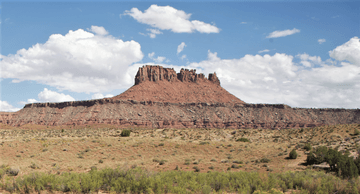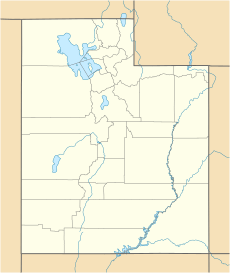Elaterite Butte facts for kids
Quick facts for kids Elaterite Butte |
|
|---|---|

Elaterite Butte, west aspect from Elaterite Basin
|
|
| Highest point | |
| Elevation | 6,552 ft (1,997 m) |
| Prominence | 752 ft (229 m) |
| Isolation | 4.88 mi (7.85 km) |
| Parent peak | Lands End (7,151 ft) |
| Geography | |
| Location | Canyonlands National Park Wayne County, Utah, U.S. |
| Parent range | Colorado Plateau |
| Topo map | USGS Elaterite Basin |
| Geology | |
| Age of rock | Late Triassic |
| Type of rock | Wingate Sandstone |
| Climbing | |
| Easiest route | class 5.x climbing |
Elaterite Butte is a tall rock formation, or "butte," located in Canyonlands National Park in Wayne County, Utah. It stands about 6,552 feet (1,997 meters) high. You can find it in a part of the park called The Maze District.
Elaterite Butte is about 6 miles (9.7 km) southwest of Ekker Butte. The Maze Overlook, a popular viewing spot, is about 2.5 miles (4 km) to the northeast.
This butte is made mostly of a hard, fine-grained rock called Wingate Sandstone. This sandstone formed from ancient sand dunes that were deposited around 200 million years ago. Below the Wingate Sandstone is a softer layer of rock, about 432 feet (132 meters) thick, called the Chinle Formation. The top of Elaterite Butte rises over 1,400 feet (427 meters) above the nearby Elaterite Basin.
The butte and the basin are named after a unique substance called elaterite. This is a dark brown, sticky, and somewhat elastic mineral resin. It seeps out from parts of the nearby White Rim Sandstone.
Getting to this remote butte usually requires a special four-wheel drive vehicle. The road leads through Elaterite Basin. Any rain that falls on Elaterite Butte eventually flows into the nearby Green River. The Green River then joins the larger Colorado River.
What's the Weather Like?
The best times to visit Elaterite Butte are during the spring and fall.
The area has a type of weather called a Cold semi-arid climate. This means it's a desert, but it can get quite cold in the winter. The average temperature in the coldest month is usually below freezing (0°C or 32°F). Most of the yearly rainfall happens during the spring and summer months.
This desert climate gets less than 10 inches (254 mm) of rain each year. Snowfall during the winter is usually light.
 | William M. Jackson |
 | Juan E. Gilbert |
 | Neil deGrasse Tyson |



